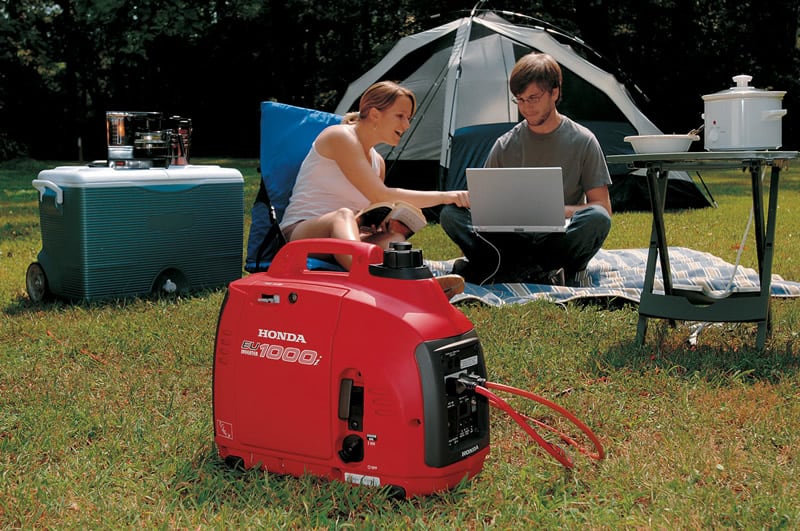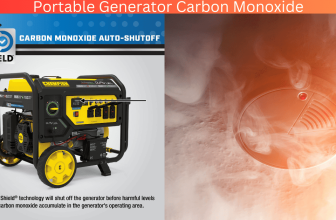
Introduction To Portable Generator Safety
Portable generators are a lifesaver during power outages caused by storms, hurricanes, or other unforeseen events. However, if not used properly, they can pose serious risks to you and your family – including carbon monoxide poisoning, electric shock, and fire hazards.
In this blog post, we’ll provide you with 10 essential portable generator safety tips that will help keep you and your loved ones safe while enjoying the benefits of temporary power.
Key Takeaways
- Portable generators pose serious safety risks if not used properly, including carbon monoxide poisoning, electric shock, and fire hazards.
- To ensure safe operation of portable generators, follow essential safety tips such as proper location and ventilation to prevent carbon monoxide poisoning, grounding to avoid electric shock, avoiding overloading the generator with appliances or tools that exceed its capacity rating and using appropriate extension cords specifically designed for outdoor use with three-pronged plugs that meet UL, Intertek or CSA standards.
- Additionally, before refueling your generator always turn it off and let it cool down entirely. Regularly maintain and inspect your generator at least twice a year to keep it in optimal working conditions. Install carbon monoxide detectors close to sleeping areas in case of hazardous emissions from the generator. Remember that prevention is key when relying on portable generators during emergencies.
Understanding Portable Generator Safety Risks
Portable generator safety risks include carbon monoxide poisoning, electric shock, and fire hazards.
Carbon Monoxide Poisoning
The silent and deadly nature of carbon monoxide (CO) poisoning is a significant safety risk associated with portable generators. This odorless, colorless, and tasteless poisonous gas can be produced when fuel in the generator doesn’t burn completely.
To protect yourself and your family from this invisible threat, always use portable generators with integrated CO safety shutoffs – a feature recommended by Consumer Reports.
The leading cause of generator-related fatalities is using a generator in an enclosed or partially enclosed space; therefore, ensuring proper placement at least 20 feet away from any door, window, or vent is vital for preventing dangerous accumulation of gas inside your home after a natural disaster.
Furthermore, install battery-powered or plug-in CO detectors with battery backups throughout your living area to ensure early detection of potentially harmful CO levels.
Electric Shock
One of the significant risks associated with portable generators is the potential for electric shock. This can occur if the generator is not properly grounded or connected to your home’s electrical system, leading to accidents and injuries.
To mitigate this risk, it’s essential to follow safety guidelines such as installing a transfer switch before connecting your generator to household wiring.
In addition to using a transfer switch, you should also ensure that all connections are made using proper extension cords with ground fault circuit interrupters (GFCI). These devices help prevent shock by cutting off electricity supply in case of an issue like a short circuit or overload.
Remember to use only three-pronged plugs for all connections with your generator, as recommended by OSHA guidance, and have a qualified electrician inspect any setup involving portable generators at home or on construction sites where work lights and power tools may require temporary power sources.

Fire Hazards
One of the often-overlooked risks associated with portable generators is the potential for fire hazards. This can result from improper fuel storage, overloading electrical circuits or using damaged extension cords.
To prevent such disasters, always store your fuel in ANSI-approved containers and place them away from living areas and any potential ignition sources. Additionally, avoid overloading your generator by staying within its wattage rating limits and use high-quality extension cords specifically designed for outdoor use with three-pronged plugs that meet UL, Intertek, or CSA standards.
10 Essential Portable Generator Safety Tips
– Properly locate and ventilate your generator to avoid carbon monoxide poisoning and fire hazards.
– Ground your generator and avoid overloading it to prevent electric shock and damage to appliances.
– Use proper extension cords, turn off the generator before refueling, regularly maintain and inspect it, install carbon monoxide detectors, keep it dry and protected, store fuel safely, and educate family members on safety guidelines.
Proper Location And Ventilation
One of the most crucial safety considerations when using portable generators is proper location and ventilation. According to the Electrical Safety Foundation, generators should always be placed outside in a dry, well-ventilated area, at least 20 feet away from doors, windows, and vents to prevent dangerous carbon monoxide (CO) fumes from entering your home.
This means that basements, garages, sheds or any enclosed areas are not suitable locations for portable generators because they can create deadly levels of CO in just minutes.
To ensure sufficient ventilation, it’s important also to direct the exhaust away from living areas and any air intakes while keeping windows and doors open when using a generator.
Keywords: Portable Generator Safety; Electrical Safety Foundation; Carbon Monoxide (CO); Proper Location; Ventilation; Basements; Garages; Sheds; Enclosed Areas; Deadly Levels of CO Fumes
Grounding Your Generator
Grounding your generator is critical to ensure safe operation. A grounding wire should be attached to a grounding rod or other approved device, and the generator should be placed on a dry, level surface away from any flammable materials.
Remember that portable generators should only be used as temporary power sources, not permanent solutions. So when using an extension cord with your generator, make sure it has a three-pronged plug and is rated for the intended load.
Home generators are best installed by qualified electricians and must bear nationally recognized safety labels such as UL, Intertek, or CSA marks for added protection.
Avoid Overloading
It’s important to know the maximum wattage your generator can handle, and not exceed it. Overloading a portable generator can lead to damaged appliances, overheating of the generator, and even pose a safety hazard.
To avoid overloading your generator, assess how much power you need before starting it up. Be sure to consider the starting watts required for each appliance or tool that will be connected to the generator.
If you’re unsure about how much power an appliance requires, refer to its owner’s manual or consult with a qualified electrician. Keep in mind that continuously running high-power appliances like air conditioners or refrigerators may require a larger capacity generator than smaller electronics like phones or laptops.
Use Proper Extension Cords
When using a portable generator, it’s essential to use the right extension cord to ensure safety. The extension cord should match the intended load and wattage of the generator.
If this is not taken seriously, it can result in overheating or malfunctioning of your generator.
It’s important to keep the cord short as well because longer cords can increase electrical resistance leading to electrical fires. It’s also vital that during storage and transportation, you remove any kinks in your power cords as these could cause damage if left untreated.
Turn Off Generator Before Refueling
One of the most critical safety tips for using a portable generator is to turn it off before refueling. While this may seem like common sense, it is essential to remember that generators run on flammable gasoline and can ignite if fuel spills or comes into contact with hot engine parts.
To avoid any chance of fire, wait until the generator is entirely cool before refueling.
According to important facts, at least 770 deaths have been reported in the past decade due to carbon monoxide poisoning from portable generators. Turning off the generator before refueling ensures that no leaks or spills happen when adding fuel and contributes significantly to keeping you and your family safe.
Regular Maintenance And Inspection
As someone who relies on a portable generator, it’s important to understand that regular maintenance and inspection are crucial for ensuring your safety.
Taking care of your generator can prevent potential hazards such as fires, electrical shocks, or carbon monoxide poisoning. It’s recommended that you inspect your generator at least twice a year and before every use.
Additionally, keep in mind that maintenance isn’t just limited to the physical components; it also includes proper usage practices. Never overload your generator or run it continuously without giving it rest breaks to cool down.
Remember to always turn off the generator before refueling and only use fresh gasoline stored safely in an ANSI-approved container away from any heat sources.
Install Carbon Monoxide Detectors
One of the most critical safety tips when using a portable generator is to install carbon monoxide detectors. Carbon monoxide is an odorless and colorless gas that can be deadly, making it essential to have an early warning alarm system in your home.
The National Institutes of Health (NIH) recommends installing battery-operated CO alarms or plug-in CO alarms with a battery backup close to sleeping areas, providing early detection in case of hazardous emissions from your generator.
In fact, carbon monoxide from generators has led to at least 770 deaths in the past decade alone.
Keywords: Carbon Monoxide Detectors, Portable Generator Safety, Early Warning Alarm System, NIH Recommendations
Keep Generator Dry And Protected
Keeping your portable generator dry and protected is crucial to ensure the safety of you and your family. Exposure to water can cause electrical shock, short circuits, and even fires.
For example, during hurricane season, many people use their generators in outdoor areas that are prone to flooding. To prevent damage or injury from water exposure, consider elevating your generator on a raised platform or installing it inside a waterproof enclosure.
By taking proper precautions to keep your generator dry and protected, you can reduce the risk of electrical hazards, fire hazards, and other accidents associated with improper use or storage of portable generators.
Store Fuel Safely
It’s important to store your fuel safely when using a portable generator. I always make sure to keep my gasoline in an ANSI-approved container that is specifically designed for storing fuel.
It’s also crucial to keep your fuel away from any ignition sources, such as open flames or sparks.
Additionally, you should never store fuel inside of your home or garage since this can lead to a fire hazard. Instead, find a cool and dry spot outside where you can store your gasoline in a secure location that is out of reach of children and pets.
Educate Family Members On Generator Safety
It’s important to make sure that everyone in your household is aware of generator safety rules. You never know who may need to operate the generator in an emergency and it’s better to be prepared.
Make sure they understand not to run generators indoors or in partially enclosed spaces, like garages or basements, even with doors and windows open.
Talk about the dangers of carbon monoxide poisoning associated with using generators and emphasize that battery-operated carbon monoxide detectors are a necessary addition for homes using portable generators.
The Importance Of Following Safety Guidelines
As a portable generator user, it is incredibly important to follow all safety guidelines to protect yourself and your family from potential accidents or fatalities. Carbon monoxide poisoning is the most significant danger associated with portable generators, causing numerous deaths in recent years.
Another crucial safety guideline to keep in mind when using a portable generator is proper installation and positioning. Generators should never be operated inside homes, garages, or enclosed areas that could trap CO gas.
Additionally, only one model on the market meets Consumer Reports‘ criteria for an Excellent rating on CO safety – the Ryobi RYi4022X inverter generator.
Lastly but not least important – Educate everyone who lives with you on how to operate the equipment safely by reviewing these guidelines together regularly.

Conclusion
By following these 10 essential portable generator safety tips, you can protect yourself and your family from the risks that come with using generators.
Remember to always use your generator in a well-ventilated area, avoid overloading it, properly ground it with a GFCI, and regularly maintain it for optimal performance.
Keep in mind that generators are only meant to be temporary power solutions and should never be used inside homes or enclosed spaces.
FAQs:
How can I safely use a portable generator at home?
To safely use a portable generator at home, make sure to read and follow the manufacturer’s instructions, keep the generator outside in a well-ventilated area away from windows and doors, and never operate it in an enclosed space like a garage or basement.
Can I plug my generator directly into my home’s electrical system?
No, you should never plug your generator directly into your home’s electrical system as this can cause backfeeding of electricity and potentially harm utility workers or damage equipment. Instead, use extension cords to connect appliances directly to the generator when needed.
What types of fuel are safe for portable generators?
Most portable generators run on gasoline but propane is also considered a safer option since it produces fewer emissions and has less risk of fire or explosion than gasoline.
When should I turn off my portable generator?
Always turn off your portable generator before refueling or performing maintenance tasks such as cleaning the air filter or changing the oil. Additionally, if you notice any unusual smells or sounds coming from the unit while it is running, immediately turn it off and have it inspected by a qualified technician.





